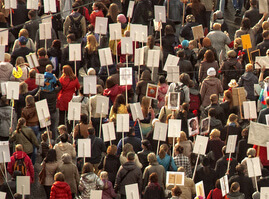Moral Peacocks vs. Real Religion: Hallmark of Our Time
By Neil Earle

One of the signs of our times is the phenomenon of “political correctness” (PC) or “virtue signaling” as it has come to be known.
When the Toronto Chick-fil-A franchise opened in Toronto on September 6 multitudes stood in line for twelve hours to sample the product. However the Toronto activist group “The 519” were out in force shouting “Shame, shame.” The family owners of the international fast-food outlet had come afoul years before of those who felt the policy of not hiring LGBTQ2 was morally reprehensible.
These disputes are, of course, signs of the time.
“Selective morality”
Such displays of selective morality involve everything these days from buying sports shoes or displaying the American flag or a MAGA hat and most of the public is understandably sick and tired of it. This approach to controversial public issues could also be labeled “cheap virtue” since it costs virtually nothing to protest such occasional events. It gives some people a chance to show what superior moral beings they are – moral peacockery!
There may be nothing ultimately wrong about boycotting or not patronizing a business for deeply-held personal beliefs, I’ve been in some protest movements myself, but…we need some common sense here. Cheap virtue is part of the shallowness of our times and abetted by what C.S. Lewis called “the cataract of nonsense” that pours from the daily press. Bring a camera to a proceeding and anyone can posture to sound like Albert Schweitzer or Mother Theresa. Not long ago it did take real courage and commitment in many ways to lie down in front of a bulldozer or attack a whaling ship or chain yourself to a nuclear sub. A different level of activism than protesting fried chicken sandwiches. Or buying sneakers.
There seems little doubt that with the erosion of religious commitment in our culture, “PC” or “virtue signaling” has become a form of religion to many in our post-Christian culture. And that invites deeper scrutiny.
The Founder of Christianity went to the cross for what he really believed. Ultimately all true Christian practice has to come back to Him. Real religion in the Christian vein asks not only what the teachings of Jesus were but, almost as important, how would his message affect his disciples.
 Mount of the Beatitudes: For Christians, a good place to remember the teaching.
Mount of the Beatitudes: For Christians, a good place to remember the teaching.Starting at the End
First, what is the central goal of the Christian religion? Theologian Kenneth Grayson summarized it as “the union of all things in Christ” (Ephesians 1:10). The most basic point of the church – those trying to imitate their Master’s morality – is that it belongs to Christ and exists for him, adds counselor Geordie Ziegler. Clearly, then, this business of seeking our own definition of virtue is a dubious business. One of the exemplary Christians of all time, St. Paul, asserted in a most famous passage that it is possible for a human being to offer their body to be burned in self-sacrifice and yet miss the mark (1 Corinthians 13:3).
How can that be?
In one sense the answer is obvious. It’s the old human failing of trying to achieve spiritual perfection by a focus on self. Jesus bewailed the Pharisees for their scrupulosity over counting out seeds and plants as a worship offering and yet missing the weightier matters. “How terrible for you teachers of the Law and Pharisees, hypocrites!” Jesus protested, “You give to God one tenth even of the seasoning herbs such as mint, dill and cumin, but you neglect to obey the really important teachings of the Law, such as justice, mercy and faith.”
“Social justice warriors” claim to be all about restoring mercy or fair play to our culture which is a noble goal as far as it goes. But along with these acts, said Jesus, comes genuine mercy, an out-flowing generosity and kindness even towards our adversaries, a gentle respectful approach to our persecutors. That is not the immediate image conjured up today when we hear the words “social justice” protests. We’ve all seen the violent media reportage.
Again, most of this misdirected behavior springs from cherishing our own ideas of what morality is. In essence it is the old human attempt to attain goodness by our own devices, a most fruitless and self-blinding endeavor. Israel's prophets warned about this years ago, The human reason is deceitful above all things and desperately sick according to Jeremiah (Jeremiah 17:9). Jesus reinforced this by advising us to check our own attitudes at the door before setting off to accuse someone else (Matthew 7:3).
Yet Jesus also taught, Be perfect as my Father in heaven is perfect.
How to square this circle?
 Social justice protests don't immediately conjure up images of generosity and kindness toward adversaries. Basil Wolverton drawing
Social justice protests don't immediately conjure up images of generosity and kindness toward adversaries. Basil Wolverton drawingAn Imputed Righteousness
St. Paul showed how in his writings to the Christians in Philippi. Paul himself began his career as a vehement activist, violently resisting the new Christian movement which he misjudged as blasphemers and heretics (Acts 26:9-11). Later on Paul turned his back on any notions of his own righteousness and caught a new and more elevated vision, one that came through faith in Christ. He called it “the righteousness from God that depends on faith” (Phillipians 3:9).
The justice, mercy and faith Jesus taught rockets past human notions of self-will and self-deception. Paul wrote to friends in Rome about an “imputed righteousness” that comes from God to us (Romans 4). This imputed righteousness of God, said Paul, is passed on to those who believe; believe in “him (God) who raised from the dead Jesus our Lord.”
God the Father has all kinds of virtue and goodness. We see it exhibited in the life and example of his son Jesus Christ. It flows out from the heavenly places where Jesus prays and intercedes for his struggling people every day (Hebrews 9:12-14). This true righteousness which covers our sins and faults is poured into us like a healing restoring balm through the ministry of the precious Holy Spirit of God. There is a Trinitarian process at work. “God’s love has been poured into our hearts through the Holy Spirit who has been given to us” (Romans 5:5). And unless love is at the heart of protest it backfires every time.
 The love relationships inside the Triune Godhead anchors all true morality.
The love relationships inside the Triune Godhead anchors all true morality.The Trinitarian Pattern
It works like this. Even before anything physical existed, even before Time itself, in the far-off boundaries of eternity, God the Father and God the Son enjoyed perfect mutual relationships. They were in perfect unity through the harmonizing love of the precious Holy Spirit. In order for us to participate in this relationship the divine Son became a human being, the One we know as Jesus Christ. He came to remove the barrier of sin but also to draw all humanity to himself by sending the dynamic attracting power of the Holy Spirit (John 12:32).
Right now Jesus sits at the right hand of the Father still retaining aspects of his humanity. In this way He serves as our High Priest, the Bridge, the Reconciliation, between man and God. But his last night on earth he spoke of the Holy Spirit that unites the Father, Son and Holy Spirit together in the universe-reigning Kingdom of God. It took Jesus the human being to come among us and lay down his life for us to grant access to the Father. But we are effectively “joined” to the Father and Son by the work and ministry of the Spirit through whom the Father and Son live and reside within us (1 Corinthinans 6:17).
This gets to the heart of God’s plan for us. The very love of God that activates all true Virtue and morality is a gift of the intervening ministry of the Spirit here on earth and the perpetual intercession for us of the Son in heaven. The Spirit is vigorously active. It regenerates us and passes on the very attributes of God himself – including right morality and an ever-deepening catalogue of virtues that the New Testament celebrates: self-control, godliness, brotherly affection. “Make every effort to supplement your faith with virtue,” Peter told his disciples (1 Peter 1:5). And this is the true virtue that comes about as result of us participating in the relationship between the Father, Son and Holy Spirit.
Without this divine love human beings setting off on their own to effect righteousness can make matters even worse. After all, you can get killed in a peace rally!
Virtue is a Person
For the Christian, then, Jesus Christ defines true virtue and godliness. Through the work of the life-giving Spirit the Son comes to live his life of faithful obedience and service within us. By obedience and prayer we come to possess the mind of Christ. “By abiding in Christ, by attending to his voice, which is present to us through the Spirit,” writes Ziegler, “we are made to share and participate in Jesus’ relationship with the Father.”
And what is the result of all this Spirit-led activity?
“We learn to think, worship and serve in a God-centered way (Romans 12:1-2),” says Ziegler. “Abiding in the love of God in this way means not abiding in the various mindsets that contradict the life and love of God.”
We do it all rather feebly compared to Christ our great Example, of course. This is why to deepen Christ’s presence inside us entails constant conversion, repenting, seeking and obeying. That’s a lot harder than screaming slogans and holding placards. Without this vital life-changing spiritual preparation and participation we can actually do more harm than good in our Virtue-quest, treating people unlike us as evil and – God forbid – enemies to be resisted or even destroyed. This debased form of Virtue-signaling is often the stuff of our nightly news.
“It is not in man that walks to guide himself,” Jeremiah said. So in our world of human-based moral peacockery we have to see it for the idolatry that it often is. Our world seems determined to become more and more divided and hostile. But Christians anchored to the love relationship inside the Triune God have room to contribute. They can make a difference and stand against the negative tides that erode our culture. And what a challenge that is!